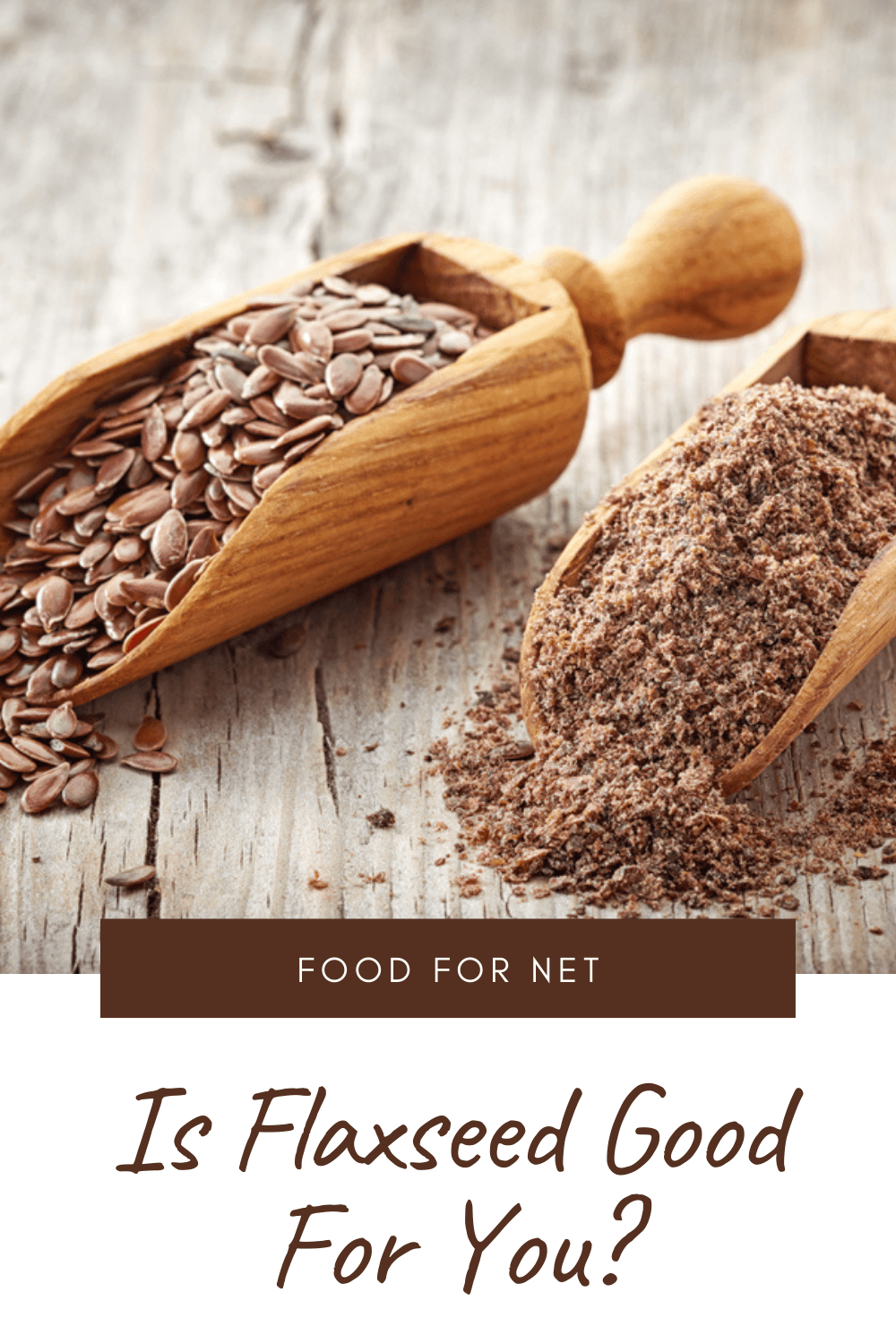
It’s easy to pass over the small, brown, and somewhat boring seeds from the flax plant. They don’t even have the same amazing reputation and nutritional superstars like chia seeds. Yet, they still contain plenty of nutrients. We have to ask then, is flaxseed good for you?
You know the story by now, right? Most foods have many benefits and at least a few concerning features. The best way to stay healthy is to be aware of the benefits and the risks. That way you can make good choices about your food.
Flaxseed is no exception, partly because it is a decent source of calories. That’s not all, there are other areas to think about as well.
There’s one more thing to mention before we begin – the name. Some people use the term flax seeds, while others say flaxseed instead. The first of these, flax seeds, often refers to the seeds themselves, while flaxseed can refer to the ground powder.
Honestly though, that’s just semantics. Plenty of people talk about ground flax seeds or use the term flaxseed to refer to the whole flax seeds. You can use whichever version you like. For this post, we’re sticking to flaxseed.
Is Flaxseed Good For You?
- What Is Flaxseed?
- Flaxseed Nutrition
- Benefits Of Flaxseed
- How Flaxseed Could Be Bad For You
- How Do You Use Flaxseed?
- What About Flaxseed Oil?
- Final Thoughts
What Is Flaxseed?
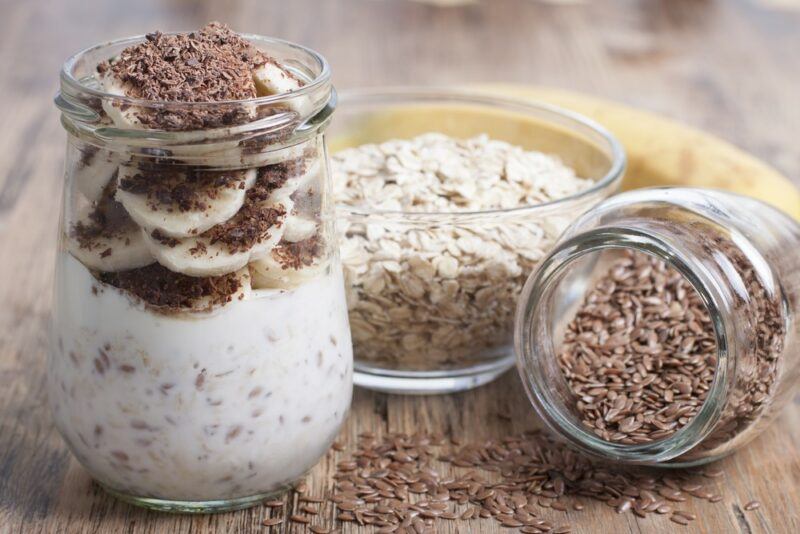
Flax is a common crop, often grown for its fiber content. Flax seeds are, quite simply the seeds from flax. They offer similar benefits to other types of seed, which include being packed with protein, fiber, nutrients, and healthy fats.
However, most of the time, people don’t eat the whole seeds as a snack (if you want to snack on seeds, pumpkin seeds and sunflower seeds are a better choice). The seeds are often ground instead or scattered whole on top of meals.
Is Ground Flaxseed Healthier?
While grinding flaxseed doesn’t change the nutritional profile at all, the process does make the seeds easier to digest. In fact, unground flax seeds can pass through your digestive system whole. If that happens, you miss out on some of the most important benefits.
Ground flaxseed is versatile too. You can simply mix it into your meals to give yourself a nutrient and fiber boost. Using flaxseed in baking is a common trick, although some people go so far as to mix ground flaxseed into mayonnaise before making a sandwich.
Such approaches make ground flaxseed as useful as a natural fiber supplement.
You can even make your own by buying the whole seeds and grinding them in a food processor or coffee grinder.
Flaxseed Nutrition
An ounce of flaxseed has the following nutritional profile:
- Calories: 150
- Carbohydrates: 8.1 grams
- Fiber: 7.6 grams
- Fat: 11.8 grams
- Saturated Fat: 1 gram
- Protein 5.1 grams
You also get decent amounts of manganese, thiamin, magnesium, phosphorous, and copper from the seeds, along with smaller amounts of iron, calcium, selenium, folate, and various other nutrients.
Those nutrients are all important. You need sufficient amounts of every one of them to keep your body functioning well. However, the vitamins and minerals aren’t what make flaxseed stand out. The healthy fats and fiber end up being much more important.
Benefits Of Flaxseed
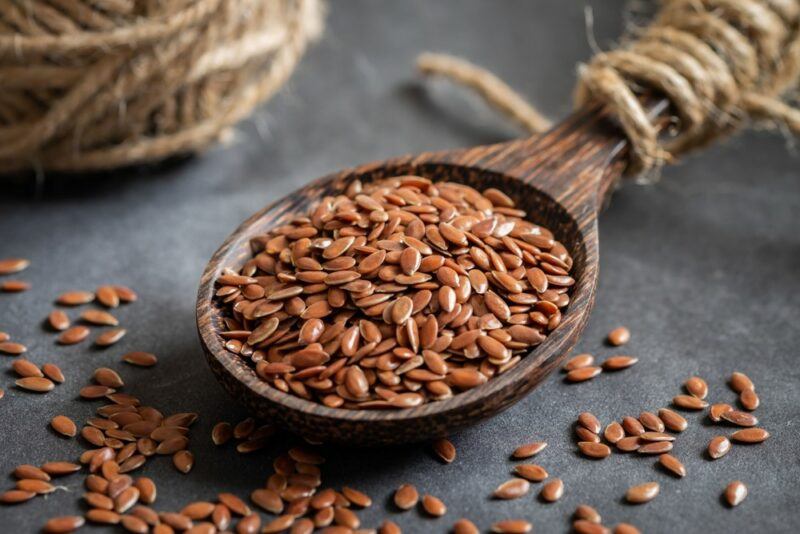
The Fiber Content
Like most seeds, flaxseed is an excellent source of fiber. This is true regardless of whether you’re focusing on the whole seeds or using the ground product instead.
Flaxseed is particularly well-known as a source of soluble fiber. This type of fiber absorbs water, so it helps to slow down digestion and makes you feel fuller. That effect is why soluble fiber can sometimes promote weight loss.
The fiber is relevant for heart disease too, as it can help to decrease your cholesterol levels and helps to balance your blood sugar levels.
There’s another reason to talk about fiber too – many of us aren’t getting enough. One estimate suggests that only 5% of Americans have adequate fiber intake, even though most of us think we are getting enough fiber.
This means that plenty of people need more fiber and flaxseed is one easy way to do so.
Omega 3 Fatty Acids
Omega 3s are easily the most famous type of healthy fat. They’re the main reason we’re advised to eat fish regularly and have been linked to no end of benefits, including better cognition, reduced risk of depression, lower cholesterol, and even longer life.
DHA, EPA, and ALA are the three main types of omega 3. DHA and EPA are by far the most powerful and are mostly found in seafood. If your diet is heavily plant-focused, you’ll be getting mostly ALAs instead.
Flaxseed is incredible for ALAs. A single tablespoon of ground flaxseed provides more than 1,500 mg of omega 3. Even chia seeds don’t give you this much ALA per serving.
Flaxseed also contains much more omega 3 than omega 6. This is important, as modern diets are often high in omega 6 and low in omega 3, a pattern that can promote inflammation and disease.
Most of the omega 3s are in the outer shell of the seeds. This shell is fibrous and tough to digest. As a result, you’ll often get much more omega 3 by focusing on ground flaxseed, rather than the whole seeds.
Polyphenols
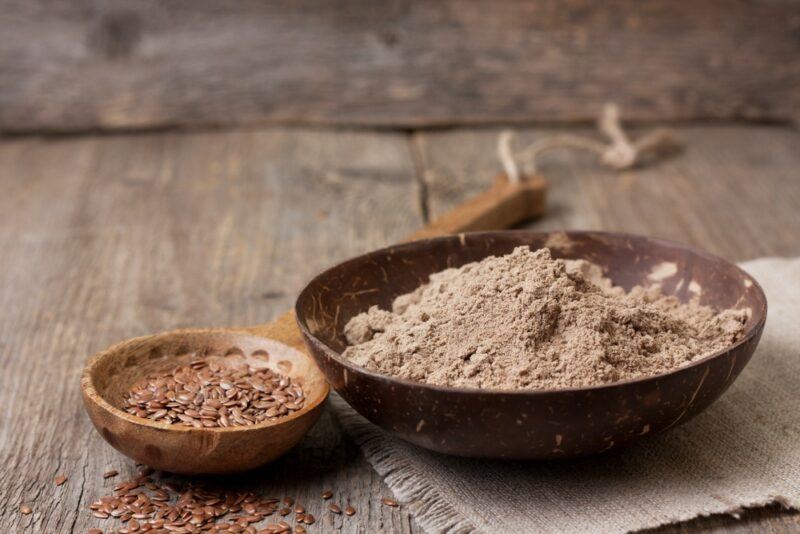
Flaxseed is also famous for polyphenols, including a type called lignans. Polyphenols are plant-based compounds that influence human health in a variety of ways.
Many polyphenols, including lignans, act as antioxidants. As such, they help to reduce oxidative stress throughout your body while helping to protect you from disease.
Lignans have some other interesting properties too.
For one thing, they’re phytoestrogens. This isn’t a bad thing though, as phytoestrogens can provide interesting benefits, including decreasing the risk of some types of cancer.
Lignans can also help to promote hormonal balance, an important effect that’s easily overlooked.
Can Promote Heart Health
Flaxseed may be particularly relevant for your heart. The fiber, ALAs, and lignans all help to improve some heart disease risk factors. This includes helping to decrease your levels of LDL cholesterol and lower your blood pressure.
Helpful For Diabetics
Flaxseed is a safe ingredient for people with diabetes, one that they can easily include in their diet most days.
There’s also the chance that the seeds help to improve blood sugar control. More research is needed in this area, but the fiber alone should help with your blood sugar levels.
Some theories even suggest that flaxseed might decrease the risk of diabetes.
There’s much we don’t know, simply because the research hasn’t been done yet. However, flaxseed is clearly a safe ingredient, one that could offer benefits, so why not try it for yourself?
Low In Net Carbs
Flaxseed might initially look like a poor choice for carbs, as an ounce of flaxseed contains close to 50 grams of carbs. However, you’re often eating less than that at a time and most of those carbs come from fiber.
In fact, a tablespoon of ground flaxseed just contains 2 grams of carbs and 1.9 grams of that comes from fiber. This leaves you with just 0.1 net gram of carbs per tablespoon. Few other nuts or seeds are quite this impressive.
How Flaxseed Could Be Bad For You
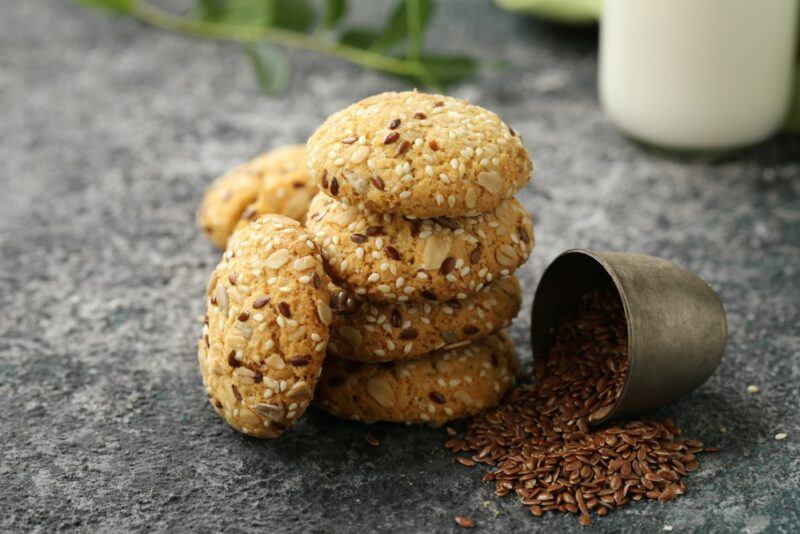
You May Experience Side Effects
High fiber foods are always a double-edged sword. While they offer many benefits, you can experience uncomfortable side effects too, including constipation, gas, bloating, and stomach cramps.
If you regularly get side effects like these, it might be a sign that you’re consuming too much fiber (more than 70 grams per day). People following high-fiber vegan diets, particularly raw food diets, should be cautious here, along with anyone who takes fiber supplements.
For most of us, however, too much fiber isn’t the issue. Instead, the symptoms kick up because we’re not drinking enough water or have suddenly changed our fiber intake.
To get around this, start slowly with fiber. Add a little into your diet at a time, along with plenty of water. This gives your body time to adjust and you should avoid the worst side effects.
If you do still get some side effects, try being patient. Most pass quickly and aren’t a sign of any serious problem.
Be Careful With Your Doses
Flaxseed is often mixed into meals and used as a way to boost fiber. While this is a fantastic approach, it does make it easy to overdo it.
After all, too much fiber isn’t good for you either. Excessive fiber intake can lead to significant cramping, bloating, gas, constipation, or diarrhea.
To get the most out of flaxseed, it’s important to make sure that the amount you are using matches your needs. If there’s already plenty of fiber in your diet, you may not need any extra fiber from flaxseed.
Flaxseed Can Interact With Medications
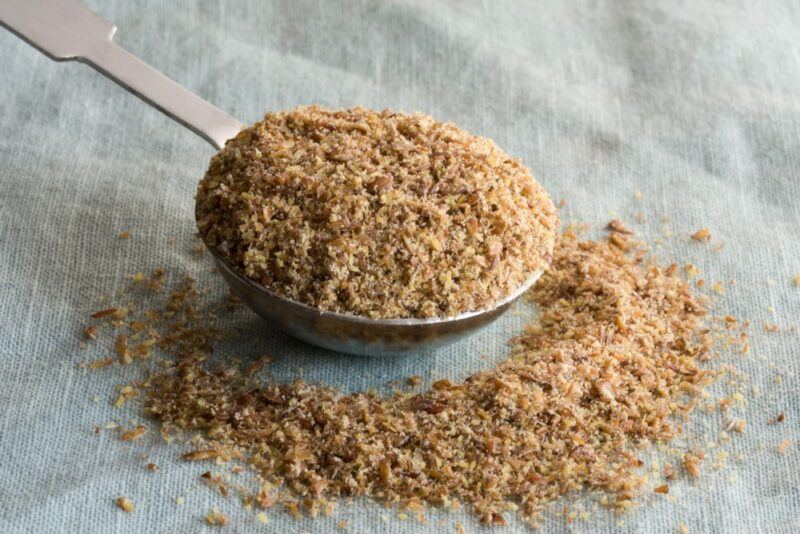
While flaxseed is relatively safe, it can interact with some medications. This is most significant for medications that have similar effects to flaxseed.
In particular, flaxseed may help improve blood flow and blood sugar control. This could be an issue for anyone taking anticoagulant medication or medications to decrease blood sugar.
Could Be A Problem If You’re Hormonally Sensitive
The phytoestrogens in flaxseed shouldn’t be a problem for most people. Indeed, such compounds offer many more benefits than risks. Even so, the similarity to estrogen can sometimes lead to issues.
Problems with phytoestrogen are most significant for women who are trying to conceive. Women with hormonal issues like PCOS could experience problems as well.
The risks here are low, so most people don’t have anything to worry about. If you experience any hormonal issues, be sure to check in with your doctor before having high amounts of phytoestrogen-containing ingredients (including flaxseed and soy).
How Do You Use Flaxseed?
Pumpkin seeds and sunflower seeds are often eaten as snacks, sometimes after being roasted. Flax seeds aren’t normally used in the same way.
For one thing, the seeds are simply too small.
If you want to eat them whole, it’s much easier to scatter the seeds on top of a meal, like a salad, yogurt, eggs, or whatever else you can think of. You can use the seeds themselves in recipes too and many people do.
However, ground flaxseed is often a much better choice. The grinding process helps to break up the seeds, increasing your absorption of ALAs and other important compounds. Plus, ground flaxseed is even more versatile than the whole seeds.
That’s not all. If you choose the right recipe, you may not even notice any flavor difference. This is particularly true if you mix flaxseed into strongly flavored dishes like meatloaf.
Don’t forget about smoothies either. They’re a popular way to increase your nutrient intake and flaxseed works well. Why not use ground flaxseed in the smoothie itself, then sprinkle some of the whole seeds on the top?
What About Flaxseed Oil?
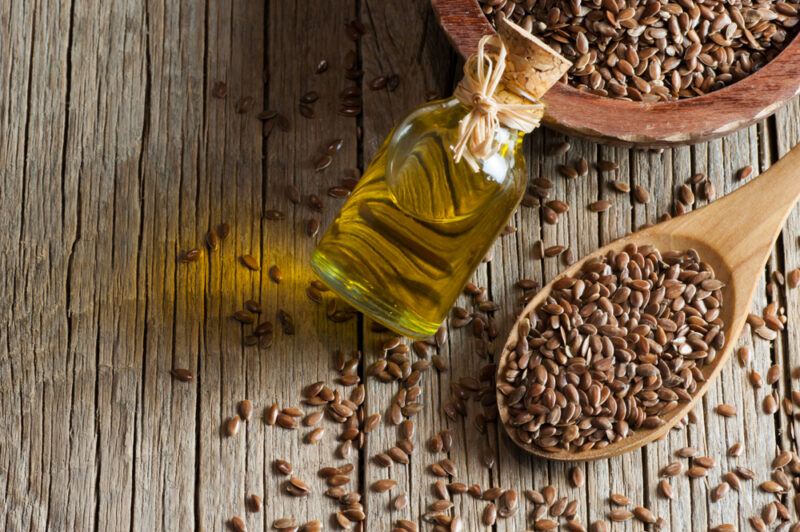
As you might expect, flaxseed oil is simply oil that has been made from pressing flax seeds. It offers many of the same benefits and risks as flaxseed itself, except that there’s no fiber in the oil.
Flaxseed oil is particularly famous for acting as a source of plant-based omega 3s. You get more than 7,000 mg of ALA in a single tablespoon of flaxseed oil. How’s that for impressive?
Using flaxseed oil in cooking could be an easy way to improve your health, as most other types of cooking oils are high in omega 6 instead. However, some of the compounds in flaxseed oil are heat sensitive, so the oil is a poor choice for high-heat cooking.
Final Thoughts
Flaxseed might not be a popular snack like pumpkin seeds or sunflower seeds, nor have the superfood status of chia seeds, but this humble brown seed still has much going for it.
The ALAs alone are enough of a reason to add flaxseed to your diet. Even if you’re getting a decent amount of omega 3 from fish, flaxseeds help to further rebalance your omega 6 to omega 3 ratio, an effect that could decrease inflammation and help to protect you.
Then there are the lignans, which may provide a host of benefits of their own. Honestly, there are few reasons not to try flaxseed for yourself. The trick, as always, is to pay attention to your body and needs. Start slowly with the seeds and see how you tolerate them. Make sure they fit into the rest of your diet too, so that you don’t overdo it with calories.
Frequently Asked Questions
What Does Flaxseed Taste Like?
Flaxseed is a mild ingredient with a slight nutty flavor. The subtle flavor means that flaxseed works well in many dishes, including pancakes, cakes, and muffins.
Does Flaxseed Cause Gas?
Flaxseed does sometimes cause gas, although not as dramatically as beans. The effect is mostly due to the fiber in flaxseeds and is most common when you increase your fiber intake too quickly.
Try starting slowly with flaxseeds (and any other high fiber foods) and give your body time to adjust. Doing so will decrease your risk of gas or any other side effects.
Is Flaxseed Good For Diabetics?
Flaxseeds have many benefits for diabetics, as they’re high in fiber and plant-based compounds. They even contain some omega 3 fatty acids. These compounds can help with your health and may even reduce the risk of diabetic complications.
How Long Does Flaxseed Last?
An unopened packet of whole flaxseed can easily last two years in the pantry. However, once the seeds have been ground, they only last between three and four months. You’ll also need to store them in the fridge to maintain their quality.
Of course, these are just estimates. You’ll often find that your flaxseed lasts much longer, especially if you store it well. However, once you get close to the storage lengths we just mentioned, it’s worth paying close attention to your flaxseeds for any signs of mold or rancidity.
Can Flaxseed Relieve Constipation?
The high fiber content of flaxseed could help with constipation in some cases. This is particularly relevant if your diet was previously low in fiber.
However, it’s important to start slowly with flaxseed. Increasing your fiber intake suddenly can lead to side effects, including gas and stomach cramps. A dramatic fiber increase probably won’t help your constipation much either.



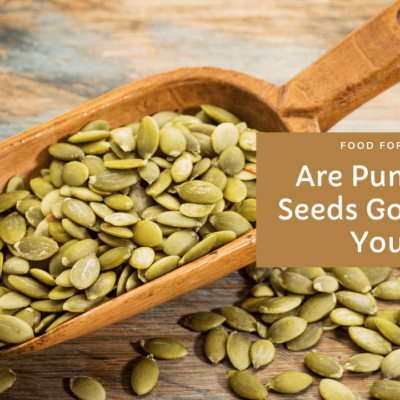
 12 Best Foods For Your Hair, Plus Three Fast Meal Ideas To Try Immediately
12 Best Foods For Your Hair, Plus Three Fast Meal Ideas To Try Immediately
Leave a Reply